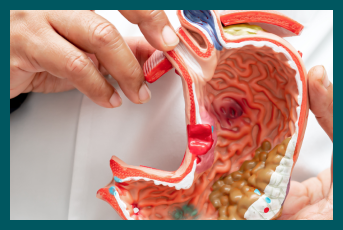How to Remove Gas from Stomach Effectively with Home Remedies?
Written by the editorial staff writer at Hola. Medically Reviewed by Dr Nelson Lau, MBBS FRACGP, GP & Digital Health Specialist. Blog updated on 01 November, 2025. Originally published on 12 July,2024.

Contents

Overview
Experiencing gas or bloating can be unpleasant, and at times, even awkward. The positive aspect? Numerous easy remedies can offer quick comfort. From calming teas to mindful eating habits, making a few minor adjustments can lead to significant improvement. And if your symptoms persist, don’t hesitate to consult an Australian telehealth doctor for further guidance.Causes
Excessive gas can affect anyone and is frequently associated with our diet, eating habits, or specific health issues. Typical culprits include:- Consuming food or beverages too rapidly – this can lead to swallowing air, drinking carbonated drinks like sodas or beer, chewing gum, or even chatting during meals.
- Digestive disorders – including irritable bowel syndrome (IBS), lactose intolerance, or coeliac disease.
- Foods that produce gas – such as lentils, beans, onions, garlic, broccoli, cabbage, cauliflower, and dairy products.
- Medications – like antibiotics or those with sorbitol.
- Changes in gut bacteria – which can occur when the balance of bacteria in the digestive system is altered.
- Stress and anxiety – hectic lifestyles can impact digestion and heighten bloating.
Foods and drinks cause gas
Certain items are more likely to cause gas, especially when consumed in large quantities. These consist of:- Cruciferous vegetables such as broccoli, cauliflower, cabbage, and Brussels sprouts.
- Legumes, including lentils, chickpeas, and kidney beans.
- Dairy products such as milk, cheese, and ice cream (particularly for those who are lactose intolerant).
- Carbonated drinks and beer.
- Sudden intake of high-fibre foods in significant amounts.
Symptoms
In most instances, gas is harmless but can be vexatious. Symptoms might include:- Digestive changes: bloating, burping, flatulence, and feeling excessively full after small portions.
- Discomfort: stomach cramps, nausea, or light heartburn.
- Bowel changes: constipation, diarrhoea, or irregular bowel movements.
Feeling sick and unsure why? Speak with a GP online in 15 minutes.
See a Doctor now
Available 24/7, across Australia.
Home remedies
Before resorting to medications, these straightforward methods may provide relief:Herbal remedies
- Peppermint tea – helps relax digestive muscles and alleviates bloating.
- Ginger – can be enjoyed as tea or chewed in fresh slices to decrease flatulence.
- Chamomile tea – soothes the stomach and minimises gas.
- Fennel seeds – chewing a teaspoon after meals can facilitate digestion.
Diet & supplements
- Probiotics – live cultures found in yoghurt or supplements may help restore gut balance.
- Apple cider vinegar – mix a teaspoon in warm water before meals (if you can handle it).
- Activated charcoal – may help absorb gas, but consult your GP before trying it.
Lifestyle suggestions
- Stay hydrated – drinking water aids digestion and helps prevent constipation.
- Exercise – activities like walking, certain yoga poses (such as knee-to-chest), or squats can help release trapped gas.
- Mindful eating – take your time while eating, chew thoroughly, and refrain from talking during meals.
- Warm compress – employing a hot water bottle or heating pad can relieve stomach cramps.
When to consult a doctor
Consult a online GP if you observe:- Severe or persistent abdominal pain.
- Ongoing bloating that doesn't resolve.
- Unexplained weight loss.
- Blood in your stool or vomiting.
- Changes in bowel habits lasting more than two weeks.
How Hola health doctors can help
Experiencing frequent gas or bloating can be uncomfortable and sometimes embarrassing, but getting help doesn’t always require an in-person visit. Hola Health’s telehealth doctors in Australia make it easy to access professional medical advice from the comfort of your home. Through a secure online consultation, a telehealth doctor can:- Assess your symptoms and rule out any underlying digestive issues
- Recommend dietary and lifestyle changes to help reduce gas
- Prescribe medications if needed
- Provide medical certificates or referrals for further testing or specialist care
Conclusion
Gas and bloating are generally not a cause for concern and can often be managed with straightforward lifestyle changes, dietary adjustments, or herbal remedies. However, if your symptoms recur or disrupt your daily life, don’t dismiss them. Telehealth provides an easy way to connect with a doctor throughout Australia, allowing you to obtain the proper advice and treatment without leaving your home. Taking care of your digestive health can lead to greater comfort, confidence, and control.FAQ
What can I drink to alleviate gas?
Warm beverages such as peppermint tea, ginger tea, or plain hot water can help relax the digestive system and relieve gas.Does consuming hot water help with gas?
Yes. Warm or hot water can calm the stomach, aid digestion, and facilitate the passage of gas.Which position aids in gas release?
Gentle yoga postures like child’s pose or lying on your left side can help move trapped gas through the digestive tract.What foods typically cause gas in Australians?
Beans, lentils, onions, garlic, dairy products, fizzy drinks, beer, and oily takeaway meals are among the most common triggers.When should I consult a doctor about gas?
If gas or bloating is severe, persistent, or accompanied by concerning symptoms like unexplained weight loss, vomiting, or blood in stools, it’s advisable to speak with a GP or telehealth doctor.Does drinking hot water relieve gas?
Drinking hot water can potentially help relieve gas and bloating for some people. Warm or hot water can promote relaxation of gut muscles and stimulate digestion.Feeling sick and unsure why? Speak with a GP online in 15 minutes.
See a Doctor now
Available 24/7, across Australia.
What we treat
- Cough
- Nausea & vomiting
- Fever
- Hayfever
- Fatigue
- Sore throat
- Acne
- Hair loss
- Gout
- Eczema
- Rosacea
- Sunburn
- UTI
- Erectile dysfunction
- Contraception
- Morning sickness
- Morning after pill
- Prostate health
- Anxiety
- Depression
- Stress
- Grief & loss
- Antidepressants
- Premature ejaculation
- Asthma
- Blood pressure
- Blood thinners
- Diabetes
- Cholesterol
- Migraines & headaches
- Allergies
- Body ache
- Heartburn & reflux
- Sleep disorder
- Pain relief
- Gastro
Related Articles
Disclaimer
This blog is for general informational purposes only and does not indicate that Hola Health provides all treatments or preventive measures mentioned. It is not intended to be a substitute for professional medical advice. Always seek the guidance of your doctor or other qualified health professional with any questions you may have regarding your health or a medical condition. For emergencies please immediately contact 000. Any medical topics discussed are intended to educate, not to imply availability through Hola Health.
 Facebook
Facebook  X
X  Copy Link
Copy Link



